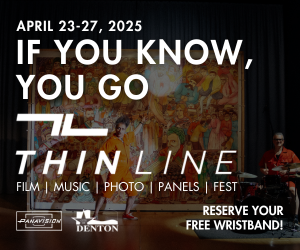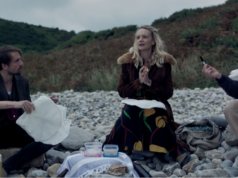Jackie Robinson’s story was already made into a rather amateurish movie in 1950, with the Dodgers’ infielder and civil rights pioneer portraying himself. It needed a new treatment, an epic canvas befitting a chapter of baseball history that’s well documented, heavy with import, and filled with complex characters and incidents that beggar belief. 42 isn’t that movie and worryingly shows no signs of wanting to be that movie. It’s just a museum piece.
The story picks up in 1945 as Brooklyn Dodgers’ team president Branch Rickey (Harrison Ford, showing welcome flashes of gruff wit) announces to his closest advisors that he intends to integrate major league baseball. The player he picks to do it is Jack Roosevelt Robinson (Chadwick Boseman, a TV actor doing his best to play a secular saint on a human scale) of the Negro Leagues’ Kansas City Monarchs, a California-bred leadoff hitter with surprising homerun power and demonic speed on the basepaths. The movie skips lightly over the year Robinson spent with the Dodgers’ minor league affiliate in Montreal, dwelling instead on his fraught but triumphant 1947 rookie season.
Writer-director Brian Helgeland has had a strange career, penning the scripts for worthy dramas such as L.A. Confidential and Mystic River but also directing odder stuff like the willfully obscure supernatural thriller The Order and the gleefully anachronistic A Knight’s Tale. The subject matter here seems to have tamped down his weirdness and any willingness to go near controversy. Trying to create scope, he takes us through dead-end subplots like the suspension of Dodgers manager Leo Durocher (Christopher Meloni) before the 1947 season. Jackie’s wife Rachel (Nicole Beharie) is reduced to a cookie-cutter supportive wife, while Wendell Smith (Andre Holland), the sportswriter for an African-American paper who’s assigned to follow the player, does little of note. Robinson’s Dodger teammates are poorly characterized, too, even though they range from supportive to neutral to downright hostile to his presence on the team.
Those are forgivable issues. Less so is this: Helgeland shows Robinson dealing with racism, but he never gives us a sense of just how widespread it was among fans, the press, and Rickey’s fellow executives. The slurs seem to come from a few troublemakers like Philadelphia Phillies manager Ben Chapman (Alan Tudyk) and Dodger outfielder Dixie Walker (Ryan Merriman). By comparison, a more forthright movie like Django Unchained does a much better job of evoking a past world where racism pervades everything and showing how its ugliness stretches into our more enlightened present day. That’s missing here, and it drains meaning from the hero’s success.
Helgeland’s fusty direction gives the movie a trapped-in-amber quality — it would have fit perfectly into the moviegoing landscape of 1993. That’s wrong. In a nation headed by a black president, we deserve a movie about Jackie Robinson that’s more hard-headed and insightful about race. While I watched 42, I kept envisioning the more nuanced and more interesting film that a tougher artist like Spike Lee or Paul Thomas Anderson would have made. That movie might have turned out as the great American story that it promised to be. The one we have in our theaters accomplishes all too little.
[box_info]
42
Starring Chadwick Boseman and Harrison Ford. Written and directed by Brian Helgeland. Rated PG-13.
[/box_info]












